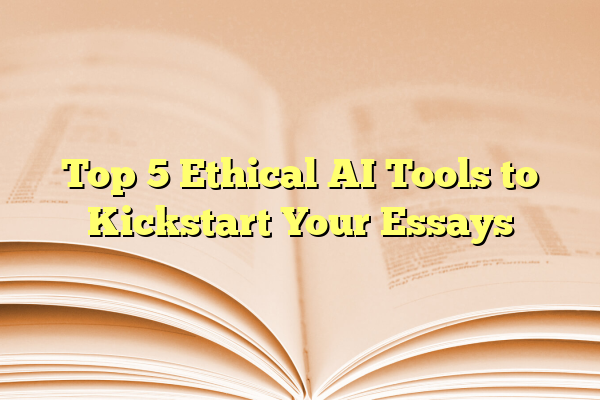
Top 5 Ethical AI Tools to Kickstart Your Essays
Starting an essay can often be the hardest part of the writing process. Whether you’re grappling with writer’s block, struggling to gather your thoughts, or simply looking for a boost in productivity, AI writing tools can offer significant support. But with so many tools available, it’s essential to choose ones that not only help craft your ideas but do so ethically. Here are the top five ethical AI tools that can help you kickstart your essays while keeping your academic integrity intact.
Contents
1. Grammarly: Your Grammar and Style Assistant
More than just a spell-checker, Grammarly uses advanced AI to help you develop clear and persuasive writing. It suggests improvements in tone, clarity, and style, ensuring your essay flows smoothly without altering your original ideas.
- Ethical angle: Grammarly doesn’t write content for you—it helps refine what you’ve already written.
- Ideal for: Polishing drafts, improving academic tone, and eliminating passive voice.

2. QuillBot: Smart Rephraser for Better Flow
QuillBot is an AI paraphrasing tool that restructures your sentences while preserving their meaning. It’s perfect for those who want to refine rough drafts or explore alternate phrasings.
- Ethical angle: QuillBot encourages understanding by showing how the same idea can be expressed in different ways. It doesn’t generate essays from scratch.
- Ideal for: Paraphrasing, improving readability, and reducing redundancy.
3. Elicit: AI-Powered Research Assistant
Elicit helps you conduct academic research by summarizing key points from peer-reviewed papers. While not a writing tool in the traditional sense, it offers critical insights that can support the foundation of your essay.
- Ethical angle: Elicit doesn’t fabricate or guess data—it retrieves verified academic content and presents summaries to aid your research process.
- Ideal for: Literature reviews, idea generation, and framing research questions.

4. Hemingway Editor: Clarity Champion
Hemingway Editor aims to make your writing bold and clear. It emphasizes concise sentence structure, reduced adverb use, and active voice—a winning formula for academic essays.
- Ethical angle: Like Grammarly, Hemingway doesn’t write your essay but improves what you’ve written, reinforcing strong communication skills.
- Ideal for: Clarity, conciseness, and enhancing the rhythm of your prose.
5. ChatGPT (with academic guidance): Idea Generator and Writing Partner
Used responsibly, ChatGPT can be an incredibly helpful brainstorming tool. It can help organize your thoughts, suggest outlines, and answer questions about structure and tone—perfect for overcoming writer’s block.
- Ethical angle: As long as it’s used as a starting point and not for direct copying, ChatGPT supports creativity and critical thinking. Always cite any generated material you’re influenced by.
- Ideal for: Generating outlines, developing arguments, and learning new perspectives.

Final Thoughts
While AI tools are transforming the way we approach writing, it’s essential to maintain academic integrity and personal accountability. These five ethical AI tools empower you to become a better writer by supporting the development of your thoughts rather than replacing them.
Remember, the true value of an essay lies in your ability to think critically and communicate effectively. Use these tools wisely, and you’ll find yourself not only completing essays more efficiently but also growing as a writer along the way.
